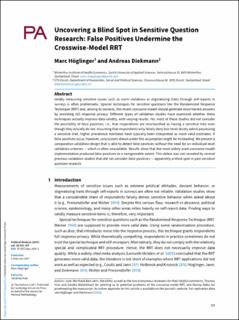Bitte benutzen Sie diese Kennung, um auf die Ressource zu verweisen:
https://doi.org/10.21256/zhaw-9064| Publikationstyp: | Beitrag in wissenschaftlicher Zeitschrift |
| Art der Begutachtung: | Peer review (Publikation) |
| Titel: | Uncovering a blind spot in sensitive question research : false positives undermine the crosswise-model RRT |
| Autor/-in: | Höglinger, Marc Diekmann, Andreas |
| DOI: | 10.1017/pan.2016.5 10.21256/zhaw-9064 |
| Erschienen in: | Political Analysis |
| Band(Heft): | 25 |
| Heft: | 1 |
| Seite(n): | 131 |
| Seiten bis: | 137 |
| Erscheinungsdatum: | 2017 |
| Verlag / Hrsg. Institution: | Cambridge University Press |
| ISSN: | 1047-1987 1476-4989 |
| Sprache: | Englisch |
| Fachgebiet (DDC): | 000: Allgemeines und Wissenschaft |
| Zusammenfassung: | Validly measuring sensitive issues such as norm violations or stigmatizing traits through self-reports in surveys is often problematic. Special techniques for sensitive questions like the Randomized Response Technique (RRT) and, among its variants, the recent crosswise model should generate more honest answers by providing full response privacy. Different types of validation studies have examined whether these techniques actually improve data validity, with varying results. Yet, most of these studies did not consider the possibility of false positives, i.e., that respondents are misclassified as having a sensitive trait even though they actually do not. Assuming that respondents only falsely deny but never falsely admit possessing a sensitive trait, higher prevalence estimates have typically been interpreted as more valid estimates. If false positives occur, however, conclusions drawn under this assumption might be misleading. We present a comparative validation design that is able to detect false positives without the need for an individual-level validation criterion — which is often unavailable. Results show that the most widely used crosswise-model implementation produced false positives to a non-ignorable extent. This defect was not revealed by several previous validation studies that did not consider false positives — apparently a blind spot in past sensitive question research. |
| Weitere Angaben: | Erworben im Rahmen der Schweizer Nationallizenzen (http://www.nationallizenzen.ch) |
| URI: | https://digitalcollection.zhaw.ch/handle/11475/9064 |
| Volltext Version: | Publizierte Version |
| Lizenz (gemäss Verlagsvertrag): | Lizenz gemäss Verlagsvertrag |
| Departement: | School of Management and Law |
| Enthalten in den Sammlungen: | Publikationen School of Management and Law |
Dateien zu dieser Ressource:
| Datei | Beschreibung | Größe | Format | |
|---|---|---|---|---|
| 2017_Hoeglinger-Diekmann_Uncovering-a-blind-spot-in-sensitive-question-research.pdf | 216.54 kB | Adobe PDF |  Öffnen/Anzeigen |
Zur Langanzeige
Höglinger, M., & Diekmann, A. (2017). Uncovering a blind spot in sensitive question research : false positives undermine the crosswise-model RRT. Political Analysis, 25(1), 131–137. https://doi.org/10.1017/pan.2016.5
Höglinger, M. and Diekmann, A. (2017) ‘Uncovering a blind spot in sensitive question research : false positives undermine the crosswise-model RRT’, Political Analysis, 25(1), pp. 131–137. Available at: https://doi.org/10.1017/pan.2016.5.
M. Höglinger and A. Diekmann, “Uncovering a blind spot in sensitive question research : false positives undermine the crosswise-model RRT,” Political Analysis, vol. 25, no. 1, pp. 131–137, 2017, doi: 10.1017/pan.2016.5.
HÖGLINGER, Marc und Andreas DIEKMANN, 2017. Uncovering a blind spot in sensitive question research : false positives undermine the crosswise-model RRT. Political Analysis. 2017. Bd. 25, Nr. 1, S. 131–137. DOI 10.1017/pan.2016.5
Höglinger, Marc, and Andreas Diekmann. 2017. “Uncovering a Blind Spot in Sensitive Question Research : False Positives Undermine the Crosswise-Model RRT.” Political Analysis 25 (1): 131–37. https://doi.org/10.1017/pan.2016.5.
Höglinger, Marc, and Andreas Diekmann. “Uncovering a Blind Spot in Sensitive Question Research : False Positives Undermine the Crosswise-Model RRT.” Political Analysis, vol. 25, no. 1, 2017, pp. 131–37, https://doi.org/10.1017/pan.2016.5.
Alle Ressourcen in diesem Repository sind urheberrechtlich geschützt, soweit nicht anderweitig angezeigt.